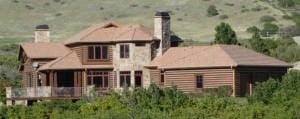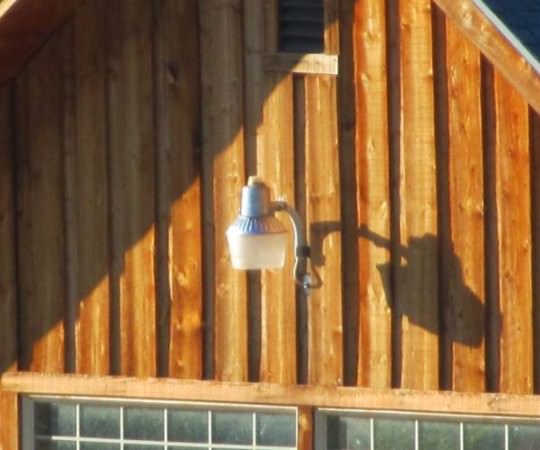Residents often choose the rural setting for its peaceful atmosphere. However, there are permissible activities that will, at times, result in unexpected noise or other impacts. Be prepared to tolerate certain uses and activities and, as appropriate, moderate your own activities in consideration of those living adjacent to you.
Living Near Active Ranches and Farms
The State of Colorado has adopted the Right to Farm” legislation as part of Senate Bill 29. This statute protects farmers and ranchers from nuisance and liability lawsuits potentially brought by neighboring (non-agricultural) properties. It is important to be aware of potential conflicts that may arise as a result of sharing the rural community with active ranchers and farmers:
- Farmers and ranchers do not work standard business hours resulting in sights, sounds, and smells at any time of the day or night.
- Noises from operation and maintenance of agricultural vehicles (such as tractors and loaders) are not uncommon in rural Douglas County. Neither are the sounds of domestic animals (e.g. bulls bellowing, mother cows calling to their calves, and roosters crowing). Very little regulation of these noises is allowed by State law.
- When living adjacent to a ranch or farm there is a good possibility that dust from planting and harvesting season, smoke from controlled burns, chemical smells of fertilizers or herbicides, and even the scent of manure may enter your home.
- Animal uses can attract flies and other insects despite property lines.
- Expect to be inconvenienced at some point by slower-moving farm and ranch vehicles or cattle that may have escaped onto local roadways.
- Colorado is a fence-out state, meaning you are obligated to install fencing to keep cattle and other livestock off your property.
Hunting and Shooting
Hunting and shooting sports are popular pastimes in Douglas County. Hunting, target practice and other activities with firearms are generally allowed in Douglas County’s rural areas, provided that the bullet does not leave the property. Any safety concerns arising from the use of firearms should be directed to the Douglas County Sheriff’s Office.
Colorado Parks and Wildlife Regulations
Please contact the Colorado Division of Parks and Wildlife for hunting and fishing regulations. Contact any private landowners for permission to hunt or fish on their lands before doing so as there could be a serious safety and legal consequences.
Mineral, Oil and Gas Rights
Property owners should know what minerals may be located under their property and who owns them. Owners of mineral rights can change surface characteristics in order to extract minerals even if the property is not owned by them. A typical title commitment may not indicate who owns the mineral rights associated with a property. This may require a specific request of the information.
Oil and gas development in Colorado is regulated by the Colorado Oil and Gas Conservation Commission (COGCC), which is a division of the State of Colorado’s Department of Natural Resources. The County has a Local Government Designee (LGD) that receives information from the COGCC about potential oil and gas activities in the County. Additional information is available regarding oil and gas development in Douglas County.
Property Surveys Help Reduce Conflicts
Property owners should ensure that their land has been surveyed and pinned by a licensed surveyor to correctly identify the physical limits of their parcel. In certain areas of the County, it is not uncommon to find fence lines and other improvements straddling property lines. This can lead to conflict between neighbors that can be difficult to resolve at a future point in time.
Zoning and Land Use
Existing and prospective landowners should understand the principles of zoning and possible land-use changes. After a property is purchased, the land surrounding your parcel may change due to existing or future development approvals. You are encouraged to contact Douglas County Planning Services before purchasing land to see if there are specific land-use projects pending and to understand the types of uses that could be developed near the property under current zone district rules. In addition, if your property is located near an incorporated city or town, you may want to check with that jurisdiction regarding any future plans for urban-level annexation and development.
As a property owner, you may wish to engage in different kinds of commercial activities in your home or on your property. Always check with Douglas County Planning Services to understand what uses are allowed, prohibited, or require additional land-use approvals. Any changes to the lot boundaries or divisions of land for sale will typically require County subdivision approval. Links to the primary land-use plans and regulations for unincorporated Douglas County are provided in the:
The following document provides specific information on the kinds of permitted home occupations and the process for obtaining County approvals: Guide to Home Occupation Permits.
Share the Road
All vehicles need to be respectful of one another and share the road appropriately. This includes residential vehicles, farm equipment, and recreational vehicles such as motorcycles and bicycles.
Working farms and ranches require a number of specialized vehicles and other equipment to manage crops (such as hay and alfalfa) and livestock. Slow-moving ranch and farm equipment utilize the County’s roadways at various times of the year. Exercise safety and patience when encountering such vehicles.
Anticipate other roadway conflicts resulting from the seasonal use of the County’s scenic roadways by recreational motorcyclists and bicyclists. Conversely, recreational vehicles should be aware of safety risks and disruptions to traffic flow which can result from riding on gravel roads, roads with narrow shoulders, or roads with high traffic volumes. The Douglas County Bicycling Map rates the County’s roads for a variety of factors related to safe bicycle travel.
Recreational Vehicle Use on Rural Properties
The recreational use of dirt-bikes, ATV’s, snowmobiles, and similar vehicles can be a popular pastime for many rural property owners. However, due to concerns regarding noise, dust, and other impacts, the County recently amended its Zoning Resolution to limit the use of motorsports vehicles on rural properties to the following:
- Agricultural or property maintenance purposes
- Occasional, incidental operation on private property that does not result in the establishment of a track
Personal-use motorsports tracks (“Private Motorsports Facilities”) are allowed only through the County’s Use by Special Review (USR) process for parcels of at least 35 acres in size with a principal residence in place. The USR process requires the submittal of various types of information, including a Noise Impact Study. Public hearings on the USR are held before the County’s Planning Commission and Board of County Commissioners, with the Board making the final decision on the request as judged against specific approval standards.
Commercial (or club) motorsports tracks are allowed only in the County’s commercial and industrial zone districts.
Prior to a change in the County’s motorsports regulations, accessory use motorsports tracks were established on properties throughout the rural areas of the county. A county review, at the request of a property owner, is required to determine if any specific track meets all legal requirements necessary to be considered a “grandfathered” (legal, nonconforming) use.
For any level of allowed motorsports vehicle use, it is important to be considerate of adjoining neighbors who value their properties for a peaceful, quiet setting. Residents are encouraged to be considerate of their neighbors by being sensitive to noise and other impacts generated by motorized recreational vehicle use on your property during particular times of day.
Pike National Forest
A large portion of Douglas County contains Pike National Forest lands. As more residents chose to live on or near national forest lands, there are several issues to consider. The Forest Service controls access across forest lands. Roads are maintained primarily for recreational uses and are not maintained at a level typically desired by residents. Few forest roads are plowed in the winter and some may be subject to seasonal closures.
Forest ecosystems are not static landscapes. In addition to natural processes such as wildfire and ecological succession, the Forest Service uses a variety of tools to manage vegetation. These include prescribed burning, grazing, and timber management. Increased threats from flash flooding can occur, including dangerous debris flows, where significant wildfires have occurred.





